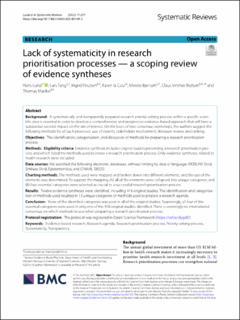Lack of systematicity in research prioritisation processes — a scoping review of evidence syntheses
Lund, Hans Aage; Tang, Lars; Poulsen, Ingrid; la Cour, Karen; Bjerrum, Merete; Nielsen, Claus Vinther; Maribo, Thomas
Peer reviewed, Journal article
Published version

Åpne
Permanent lenke
https://hdl.handle.net/11250/3060463Utgivelsesdato
2022Metadata
Vis full innførselSamlinger
Sammendrag
Background
A systematically and transparently prepared research priority-setting process within a specific scientific area is essential in order to develop a comprehensive and progressive evidence-based approach that will have a substantial societal impact on the site of interest. On the basis of two consensus workshops, the authors suggest the following methods for all such processes: use of experts, stakeholder involvement, literature review, and ranking.
Objectives
The identification, categorisation, and discussion of methods for preparing a research prioritisation process.
Methods
Eligibility criteria: Evidence synthesis includes original studies presenting a research prioritisation process and which listed the methods used to create a research prioritisation process. Only evidence syntheses related to health research were included.
Data sources: We searched the following electronic databases, without limiting by date or language: MEDLINE Ovid, Embase Ovid, Epistemonikos, and CINAHL EBSCO.
Charting methods: The methods used were mapped and broken down into different elements, and the use of the elements was determined. To support the mapping, (A) all of the elements were collapsed into unique categories, and (B) four essential categories were selected as crucial to a successful research prioritisation process.
Results
Twelve evidence syntheses were identified, including 416 original studies. The identification and categorisation of methods used resulted in 13 unique categories of methods used to prepare a research agenda.
Conclusion
None of the identified categories was used in all of the original studies. Surprisingly, all four of the essential categories were used in only one of the 416 original studies identified. There is seemingly no international consensus on which methods to use when preparing a research prioritisation process.
